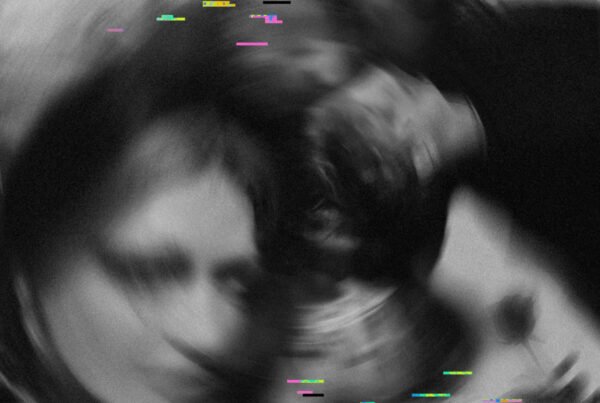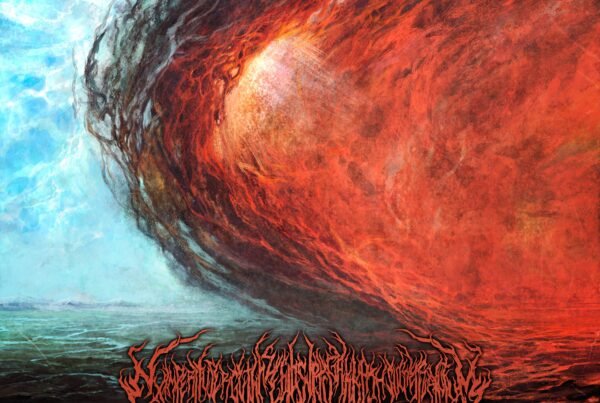Swedish post-metal trio BARRENS create a dark and beautiful world situated somewhere between the sea and the stars on their debut album, Penumbra.
Release date: April 10, 2020 | Pelagic Records | Facebook | Instagram | Bandcamp
BARRENS. I was instantly drawn to that band name, and the aesthetic of the album art for their debut album, Penumbra. The Swedish trio formed after the three guys met through Scraps Of Tape, with whom they toured for two years before forming their own band, BARRENS; and now, they’re ready to release Penumbra, a gorgeous, evocative instrumental post-metal odyssey.
If you switched off at ‘instrumental’, this paragraph is for you. Let’s talk about instrumental music. Lots of people seem to get put off, not so much by the music itself, as by the label ‘instrumental’. I think the assumption is that instrumental metal, of any kind, is extremely technical, overly-processed guitar noodling. There’s a fear for me personally, every time I read ‘instrumental’, that it’ll be cheesy djent with way too many guitar solos, and, alas, often it is. And I hate that. Not the music itself, but that ‘instrumental’ seems to be so one-sided. I have to admit here that I probably feel so strongly about this because my own band doesn’t have vocals, and we get shoved into that squeaky-clean, modern progressive box all the time if we bring this up, even though we’re about as grimy as they come; either that, or people ask, with an air of ignorance, why the hell we don’t have a vocalist, or tell us, ‘you guys would be awesome…if only you had a singer!’. So, with all of this in mind, I was thrilled to discover that Swedish trio BARRENS don’t have vocals either, and they slay. Plus, they’re not djent – they’re dark, sizzling post-metal, but not in a way that I’ve heard before, and it delights me.
What sets BARRENS apart from many other post-metal bands is their heavy use of synthesizers, usually something I’m not hugely into. They toy with the juxtaposition of very live drums and guitars with extremely synthetic keyboard tones, but also blurring the line so that at times it becomes hard to tell what’s a synth and what’s a guitar. The timbre overall is dark, often grainy, but with little flecks of warmth from the addition of glockenspiel and soft, round bass. From Penumbra’s opening track, we are presented with a feeling of vastness, outer space or perhaps underwater. This shift between subaqueous and cosmic occurs in most of the tracks, tied together by the sensation of floating through some strange terrain.
On the first listen, the sheer number of layers in the tracks can become a little overwhelming at points. Often, synths, guitars, and drums are all competing for the middle of the frequency spectrum, with cymbals, percussion, and guitars dominating the top, and bass synths, kick, and yet more guitars saturating the bottom end. Luckily, in true post-metal fashion, Penumbra lives from its huge contrasts within tracks. These densely layered sections give way to sparse landscapes of just bass, drums, and maybe some odd guitar noises, or a single synth. There’s contrast between tracks, too – from the soft and warm “Grail Marker”, through the huge, almost sludgy world of “Arc Eye”, to “Shifter”, an oddly badass computer-game-techno-meets-post-metal number. I know it sounds like a lot, and it is – but I tell you what, you’ll never get bored with Penumbra, and there’s always more to explore, so many layers to dissect.
If there’s one song that blows me away every time, it’s “Oracle Bones”, the third track, and by far the most aggressive. It has a strong sense of narrative – the first time I listened to it, I wrote down what I was imagining in the music. Basically, it started off as running away from something along a nighttime beach, and needing to escape into the freezing depths of the sea in order to get away from my follower. The sea took a hold of me and dragged me out and down; I was constantly struggling to stay just above the surface with waves all around, having lost sight of the land, and eventually got pulled down into an oceanic wonderland. It’s this extremely evocative kind of writing that I love, and I found myself glad at many points throughout Penumbra that there were no vocals to spell out the intended story for me.
The tones are full of contrast, too, and beautiful. In the guitars, we hear crystalline clean lines alongside fuzz-fuelled riffs and mellow, reverberant background layers; the synths range from twinkling and warm to almost white noise, and don’t even get me started on the sometimes lush, sometimes brutally crunchy, sometimes just wonderfully grounded bass tones. Unfortunately, even after listening to the album several times, there are a few synth tones I just can’t come to terms with. I find the deliberately grainy quality of some just gets overused, and tiring to listen to, especially in the latter half of the album. At times, the tones verge on obnoxious, and to me, they distract from the lush, pain – and wonder -filled world that is Penumbra.
Despite being on the verge of overwhelming at times, and despite my personal dislike of some of the choices of synth tone, I really enjoy Penumbra. It’s well-constructed, deeply evocative, with a richness of textures that keeps me intrigued no matter how many times I’ve listened to it. Vocals or no vocals, it’s some damn fine post-metal, and a seriously awesome debut. I’m hoping Penumbra is merely the beginning of what is likely to be a very exciting and productive career for BARRENS.






